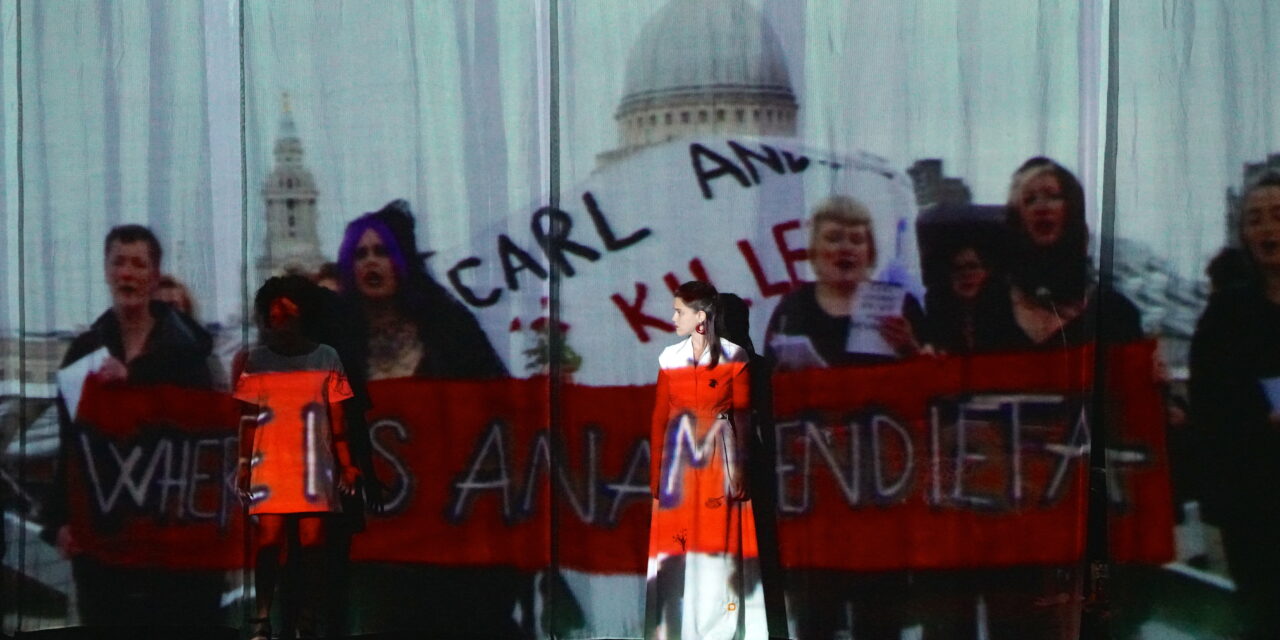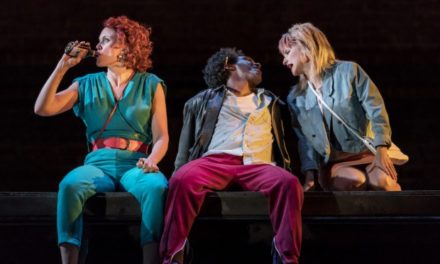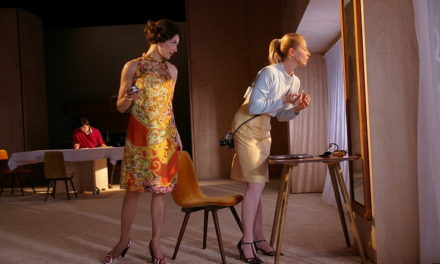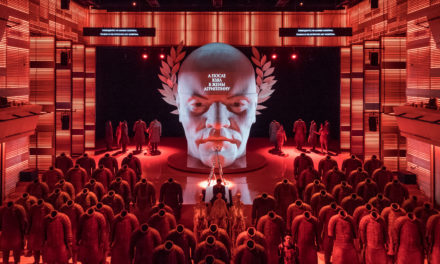In the early twentieth century, Virginia Woolf published the essay Room of One’s Own, based on a series of lectures she gave at Cambridge University on the subject of Woman and Fiction. In this book – which mixes both fictional and non-fictional elements – the author presents a women’s literature panorama over the years. In a particular moment, Woolf concludes that if Shakespeare had had a sister as gifted as himself, she would undoubtedly have had a miserable life and perhaps commit suicide at a young age. This idea is justified by the fact that women of the sixteenth century could play no other role in life but that of domestic workers. Even theater itself was an activity exclusively available for men. The author argues that women writers only began to emerge from the moment they started having some financial independence, which could enable them to free themselves from their parents or husbands guardianship. Woolf’s essay is currently considered a feminist text since it requires space for writers in a literary tradition dominated by the patriarchy.
What is the place of women in Literature and Art History? The book’s argument was the starting point for the creation of the Brazilian play There Is More Future Than Past – A Docufiction Play, directed by Daniele Avila Small and written by the director herself in partnership with Clarisse Zarvos and Mariana Barcelos. The performance displays a critical debate on Art History, considering it a patriarchal, racist, eurocentric and elitist institution. In addition to the gender issue, the play also investigates Latin American identity in the art context. In brief, the show presents an investigation on the life and work of Latin American women visual artists, who produced between the 1960s and 1980s. Although they were quite remarkable and awarded worldwide, their names are not significantly known in our society. Why? What determines that someone is made invisible in official history?
In this contemporary documentary theater lecture-performance, three actresses (Clarisse Zarvos, Cris Larin and Tainah Longras) share with the audience their paths in decolonizing their knowledge on Art History and taking a feminist Latin American standpoint. As in Woolf’s essay, the play mixes both fictional and non-fictional elements to account with some historical gaps. A piece of important information about the work is that play has been created and produced only by women in all creative and technical functions. Rather than excluding men from the creative process, this is a political gesture of occupying spaces and giving each other the opportunities we should have always had.
The dramaturgy has been published by Editora Javali (a book editor exclusively dedicated to publishing theatre books) in a Portuguese-English bilingual version. The book is not only a register of the text but most of all the presentation of a theoretical and critical in-depth research. The English choice as a second language is justified by the goal that the work cross borders and reach different audiences.
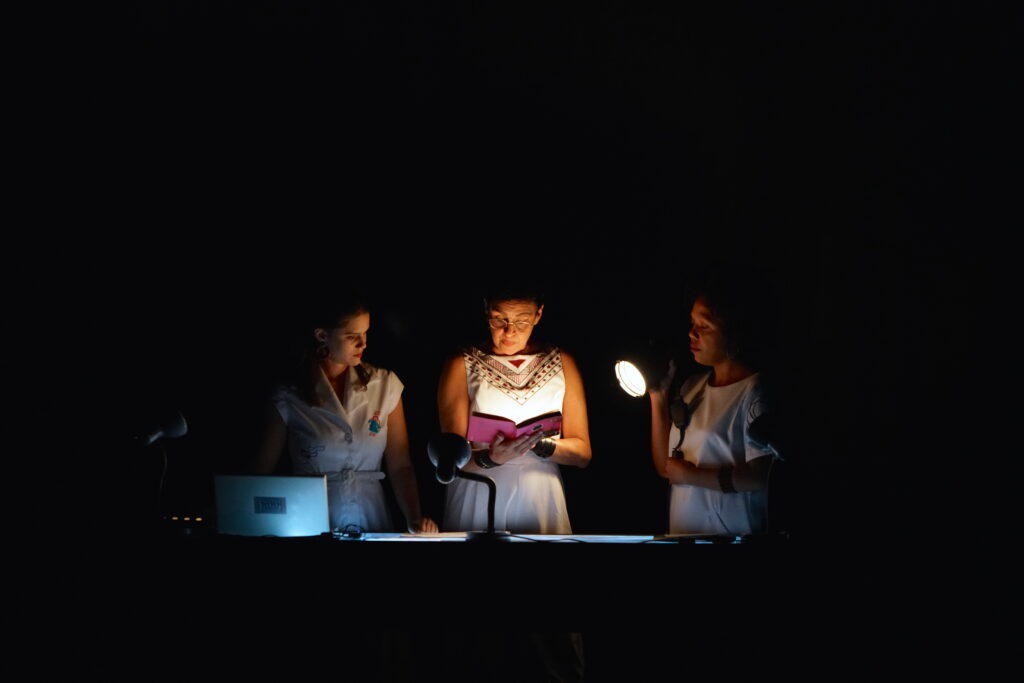
Clarisse Zarvos, Cris Larin and Tainah Longras. Photo Credit: Nityama Macrini.
THEATER, BOOK, AND CINEMA
In May 2019, the play and the book will cross the Atlantic Ocean for the first time, invited to join the Foco Brasil (Focus Brazil) program of FITEI – International Festival of Iberian Expression Theater, in Porto, Portugal. This year’s edition of the festival focuses on the theme of “decolonization of thought” in Brazil and is joining forces with DDD (Days of Dance) to bring Porto a significant number of performances. Among the other female Brazilian directors who have been invited to bring their works to Porto, are Lia Rodrigues, Alice Ripoll, and Grace Passô. The performance will take place at Constantino Nery Theatre in Matosinhos on May 24th.
The book will be released at the Confraria Vermelha Livraria de Mulheres (Red Brotherhood Women’s Bookstore) on May 25th. The feminist bookstore contains a collection composed only by female authors, as well as a productive schedule of events and debates made by and for women. No doubt this is a resistance place. If in the digital age, keeping a bookstore is already a struggle, maintaining a feminist bookstore is even a greater one. More than just a book-selling space, the Confraria Vermelha proposes to be a place of encounter, exchange, and sorority above all.
But the play is not only spreading its voice in a geographical aspect. In 2020, contemporary documentary theatre meets cinema, for distinguished Brazilian filmmaker Lucia Murat is preparing a cinematographic adaptation of the play, a film called Ana. As it is said in the performance, once us, women, start to tell our own stories, there is more future than past for us all.
Woolf says in one of the book’s passage that it is vital for women to recognize the fact that they are not alone. She adds that it is necessary that the next generations work for the memory of the women who came before them. Interestingly, the bookstore blog features a session called O quarto próprio (translation of “a room of one’s own), a citation to Virginia Woolf’s essay title. The feminist bookshop proposes to be a suitable room for women – where they are visible, independent and have a voice. Today, almost a hundred years after Woolf’s lecture, staging this play and publishing the book under a feminist roof is perhaps a possible way to give life to Shakespeare’s sister and to connect thousands of women artists from the past, the present and the future.
This post was written by the author in their personal capacity.The opinions expressed in this article are the author’s own and do not reflect the view of The Theatre Times, their staff or collaborators.
This post was written by Clarisse Zarvos.
The views expressed here belong to the author and do not necessarily reflect our views and opinions.

